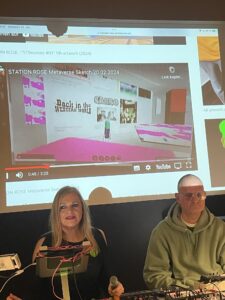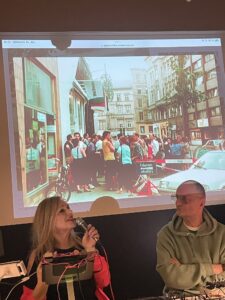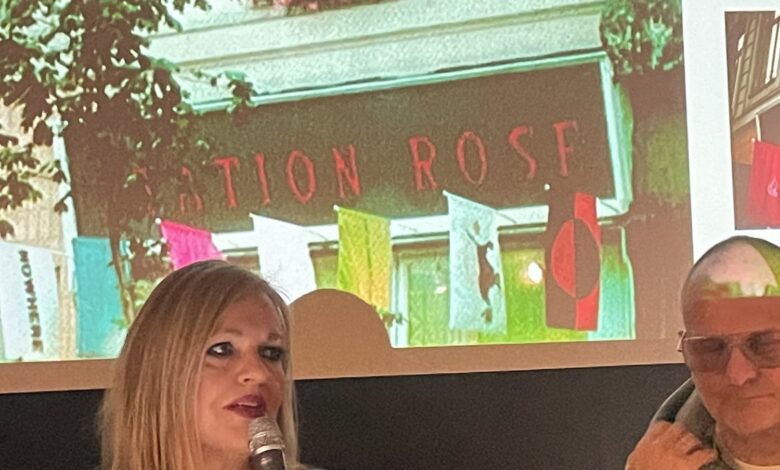
STATION ROSE: Techno pioneers from Vienna “We never had a Plan B”
Cult Vienna-based techno digital artistic duo returns to London for a presentation and an intimate live set at the Austrian Cultural Forum.
Written by Irina Shtreis (Aka “Miss Naivety”) for Cybersalon.org
“We called it “Station” with a reference to the landing on the Moon”. In 2025, 37 years on from the formation of the digital media art project, STATION ROSE still don’t belong to any specific temporal frame. The time machine of the Vienna-based retrofuturists might be hidden from the eyes of the public but their fantasy world is discernible. Seated behind their visual and audio workstations, Elisa Rose and Gary Danner invite the audience to dive into a chaotic and structured process where “anything can happen”. The “results” are displayed in the Forum’s concert hall: the front page of the duo’s bountiful digital archive on a projector screen, 3D-printed dinosaurs and AR art objects (e.g. a stitched work which transforms into a volumetric moving shape on a screen of a smartphone) placed on the 19th-century mantelpiece, and ultimately the music. With its punchy and unstoppable techno beat, the composition created for the performance combines the snappy punk vibes and lush psychedelic texture. That could be a soundtrack to a fictional rave party in an old warehouse in Detroit where The Yardbirds hang out with Saint Etienne.
“I started working as a musician during the times of punk in the late 70s and then switched to electronics in the mid-80s”, recalls Gary Danner, whose former neo-psychedelic band The Vogue scored a Top Ten Hit in 1981. “We felt quite isolated because most colleagues were stuck in the post-punk realm, and I didn’t like that. So I started making monotonous repetitive and slightly aggressive music and I didn’t know this was called techno in Detroit. I just thought it was electronics with psychedelic effects or whatever”.
Like many other inventive projects in the history of arts, the STATION ROSE concept grew out of frustration. Having graduated from the University of Applied Arts Vienna with degrees in Visual Communication and Fashion respectively, Danner and Rose had no offers where they could apply their bold ideas. Finally, they decided to “create their own culture” as Terrence McKenna advised. In 1988, the two opened STATION ROSE 11.3, a venue in the fourth district of Vienna which laid a milestone in the duo’s digital timeline. However, the new format where adventurous electronic music went hand in hand with visual and light installations did not come as necessarily straightforward for the audience in the 80s. Danner remembers the first STATION ROSE show as “funny”. “The majority of those who came to our concerts were gay. Elisa was studying fashion so we had many queer friends. All these people danced to our music, which was completely new to me”.
STATION ROSE kept on experimenting, producing their art in various formats from vinyl and floppy disks to immersive audiovisual installations NFTs. They hungrily explored new spaces too. The same year the STATION ROSE venue was launched, the duo got a grant to work in Cairo – the place where they experienced cyberpunk in practice. “By the time we went there, we had read cyberpunk literature and it all had been quite theoretical”, Danner says. “From the moment we landed in Cairo, we thought it was real cyberpunk”.
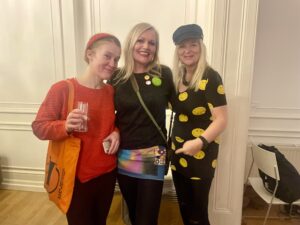
“It’s so chaotic”, Rose remembers. “In a way, I’m chaotic too because I need this crazy situation where I can focus. With a population of 10 million people, it’s unorganised and nevertheless it is organised”.
While the audience at the Austrian Cultural Forum wasn’t inclined to dance, some of those present admitted the influence of STATION ROSE during their formative years.
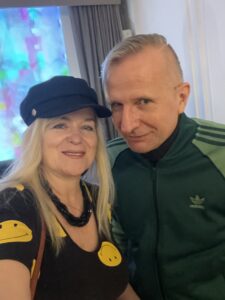 Eva Pascoe (co-founder of Cyberia Café) commented that STATION ROSE and their ‘modemocracy’ parties resonated with 90ties digital ravers and Internet pioneers’ community in London.
Eva Pascoe (co-founder of Cyberia Café) commented that STATION ROSE and their ‘modemocracy’ parties resonated with 90ties digital ravers and Internet pioneers’ community in London.
For Austria-born Stefan Lutschinger, philosopher, artist and Senior Lecturer in Digital Media at Middlesex University London, the first encounter with STATION ROSE back in the late 80s was life-changing. “They were the digital arts pioneers in Austria, this whole scene that they were part of inspired me to explore the realm of multimedia. It was my escape path”.

